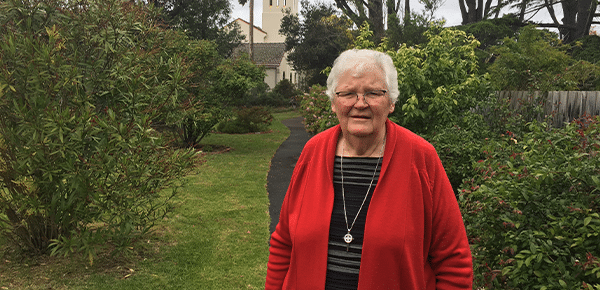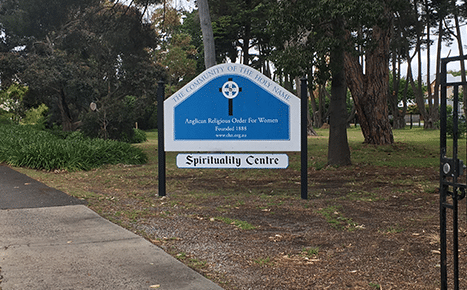
By Mark Brolly
26 November 2021
Sister Carol Tanner doesn’t fit the tradition image of Mother Superior of a religious order.
A mother of five, grandmother of 16 and great-grandmother of one – and divorced – she joined the Community of the Holy Name in Cheltenham in 1993.
Six year later, she took her vows.
“It was quite a few years after the divorce that I felt a call,” Sister Carol said.
“I didn’t know Anglican sisters even existed [before].
“My children were grown up by then, two were married and I had a couple of grandchildren … what they [said] to me was, ‘Mum, you supported us in what we want to do, so if this is what you want to do, we will support you’. And they have!”
Now in her late 70s, Sister Carol grew up in the Anglican Church and attended St Paul’s Boronia, although she was christened in the Methodist church.
It was a very different world then.
“The church in those days was your social spot. There was a faith but nothing like there is now, which is a very close relationship to God,” Sister Carol said.
“It wasn’t until I was 48 or 49 … when I changed churches after the divorce … I did find God in a different way and became much closer and life changed.”
For the past 10 years, Sister Carol has led what is Australia’s oldest Anglican religious community. It has been an experience not without its challenges.
“In one way, it’s frustrating for me because I have had life experience, I’m a practical person,” she said.
“I come in here and they’ve been closeted for so long, I think … ‘It’s extraordinary, just do it’.”
The community of sisters was founded in 1888 by Emma Silcock, known as Sister Esther, the novice of an English order who came to Melbourne for health reasons.
The sisters were identified with the Melbourne diocese’s Mission to the Streets and Lanes from its earliest days in the 1880s, until it was absorbed into Anglicare in 1997.
They also worked with St George’s Hospital in Kew, St Ives Hospital in East Melbourne, and the House of Mercy for women and girls in Cheltenham from the 1890s, which later became a retreat house. They have also been involved with a secondary school for girls and a religious community for Papuan women in Papua New Guinea.
Their former convent in Cheltenham is now a spirituality centre.
Sister Carol’s community has shrunk to 12 members aged from their late 50s into their 90s.
At 78, she is the second-youngest community member, although another woman in her 50s is to join as a postulant – the first stage towards making life vows – in December.
Four years ago, the Sisters moved out of their old convent into a new building, Esther House, at the rear of their beautiful Cheltenham property.
Not surprisingly, the Community’s future is a topic of pressing concern to the sisters. Sister Carol said the order attracted interest from different women, some suitable, some not.

She has thought about attracting them in different ways, such as with an “Alongsider” program, where women live alongside the community for a certain time. This has met with some success.
“We’ve got to be particularly careful of age because if we have a lot of young people, I can’t see how they would fit in at this stage,” she said.
“I say to women who come to talk to me, ‘You are called into a community’. One of them – she was only young – said: ‘Oh, I want to go and do this, this, this and this.’
“And I said: ‘Well, you are called to community first, then we discern where your gifts are and where God’s calling you in ministry’. I always stress that because I think that’s very important.”
Sister Carol said the sisters were considering changes to their pathway to life vows. After a novice year, new Sisters take vows for three years. These can be renewed twice.
But at any time, they can ask for life vows. The sisters are now considering whether to renew vows for 12 months at a time.
The sisters also have “oblates” and “associates”: women and men who make commitments to support the sisters, who work with them in what are now primarily ministries of prayer and presence.
The community prays together four times a day, and has the Eucharist daily when possible, apart from weekends. Some sisters are attached to parishes – St Augustine’s Mentone, St Paul’s Caulfield and St Nicholas Mordialloc – or attend their local church on Sundays, St Matthew’s Cheltenham.
They have established a nine-member board to run their spirituality centre, four of whom are sisters.
Sister Carol is open to the future. She also dismissed speculation that there is a five-year plan to wind down the community.
“I have to be realistic. I’ve come into it later and for me, it’s an exciting adventure. I’ve said it’s the fulfilment of my life,” she said.
“But [the older sisters] have been in it for years – one sister has just celebrated her 60th profession anniversary, some have got up to 70 – so I can see they’re tired and they’re done hard work.
“I suppose my favourite saying is that our future’s in the hands of God, and we just have to be there and open and prepared for whatever comes. We’re prepared if we die out, but we’re prepared also if we continue.
“You never know what God’s going to call people to.”








One Response